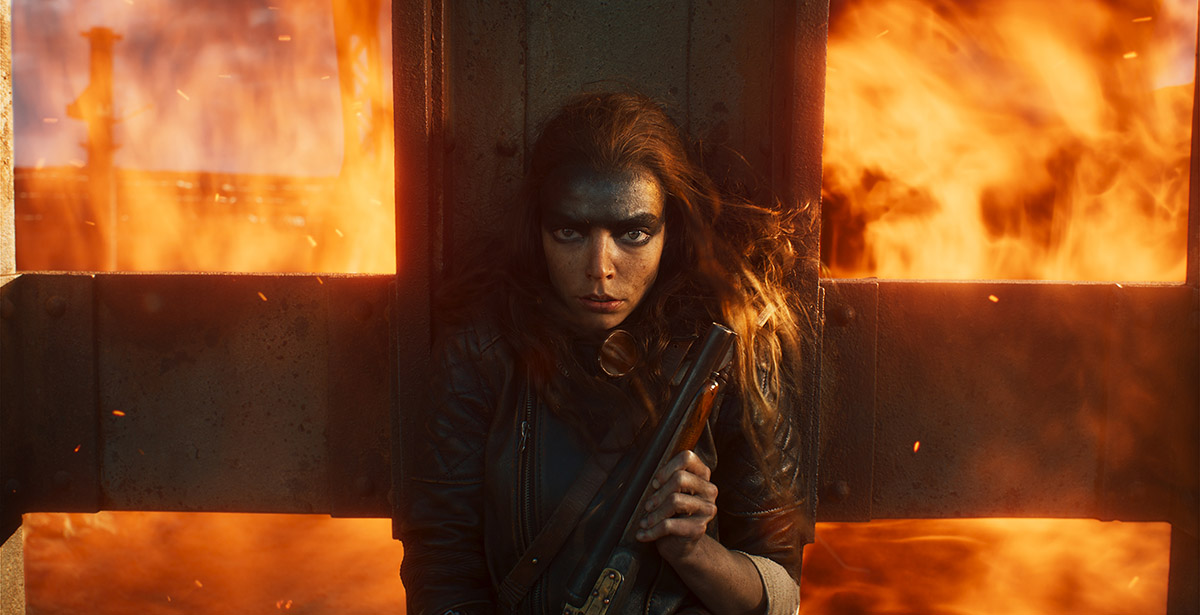In 2015’s Mad Max: Fury Road, a saying was scrawled across the room where the escaped wives of the warlord, Immortan Joe (Hugh Keays-Byrne in Fury Road, Lachy Hulme in Furiosa), spent their days. “Who killed the world?” It’s a phrase that haunts Fury Road but comes to the fore in George Miller’s prequel, Furiosa. In the 2024 film, it’s a clarion call for some kind of justice for the grief that haunts everyone in The Wasteland.
A sprawling, mournful epic about grief and rage, Furiosa is as visually stunning as its predecessor but finds deeper roots in its main character’s journey. It hits necessary prequel exposition beats that can feel perfunctory at times, but ultimately it’s the emotional journey of Furiosa (Anya Taylor-Joy) that makes the movie a worthy, somber shadow of Fury Road.
We follow Furiosa through The Wasteland across five chapters, from her time as a child in “The Green Place” to her rise in Immortan Joe’s fortress. Immediately the story structure of Furiosa sets it apart from its predecessor in an engaging way: in Fury Road, the pace is non-stop. Here, the story isn’t afraid to take its time to make us understand what makes Furiosa tick and to force us to sit with the inhumanity that has infected many residents of The Wasteland. It’s a bold and decisive choice that lets us know that although we may be in the same world, this is a new story.
With a new story comes old and new faces. Furiosa’s return is a welcome one, and in the hands of Anya Taylor-Joy, the crystalized rage Charlize Theron gave to the performance becomes something potent and malleable, like hot, liquid steel just before it cools. Taylor-Joy doesn’t have a lot of dialogue in the film, but her facial expressions and physical choices as an actor do a lot of great work to convey the pain and determination that motivate her character. A head touch with her romantic interest, Praetorian Jack (Tom Burke) is well-earned and poignant. When she does have something to say (or scream), it’s haunting. Her showdown with her chief tormentor, Dr. Dementus (Chris Hemsworth), is a moving and infuriating interaction. Taylor-Joy’s line delivery here cuts through to the sinew of her grief. “My mother, my childhood. I want them back,” she says to Dementus. Her voice crackles with incandescent rage and sorrow, and we understand her desire even though we all know it’s impossible.
Dementus is a free agent of The Wasteland, leading his hordes of bikers around, kidnapping children, pillaging whatever they find, and dismembering bodies wherever they go. As played by Hemsworth, Dementus is a bumbling, power-hungry force that has an insatiable cruelty. He relies heavily on his right-hand History Man (George Shevtsov) to explain the most mundane things and to fuel his monstrous actions. When slaughtering Furiosa’s mother, Dementus grabs the young girl’s face and asks for an explanation of the tears streaking down her cheeks. The History Man dutifully explains, and Dementus revels in the “zesty” taste of sorrow while the History Man joins in the crying. It’s a performance that’s always walking a tightrope somewhere between comic relief and repugnant villainy. Hemsworth, ever impressive, does this well, sometimes leaning a little too much into the comic relief, but delivering an overall poignant and petulant turn. When Furiosa asks him the impossible question, Dementus is honest about what The Wasteland does to grief: it creates an unquenchable thirst for vengeance that decimates you. The pair have become ensnared by their rage.
The emotional beats of Furiosa are just as stunning as the physical stunts, and fans of Fury Road’s insane car chases will find a lot of the same fare here: paragliders trail war rigs, war boys go flying into their own firey Valhallas, etc. Visually, Miller and company have done something interesting: taking the same world and imbuing it with an altogether different feeling. Furiosa’s vistas and inky blue nights feel lonelier, like the residents of The Wasteland are the last people on Earth.
The film opens with the History Man addressing the camera saying. “As the world falls around us, how must we brave its cruelties?” With this opening line, Furiosa sets itself not just as a post-apocalyptic prequel, but as a film that explores the consequences of how we treat each other in chaotic times. In The Wasteland, it seems, people can break the destructive cycle of grief and vengeance if they decide to take meaningful action instead of riding rage’s curve.

